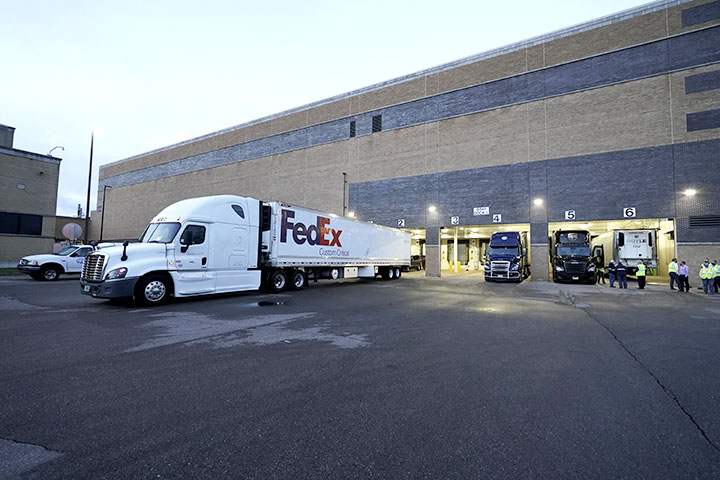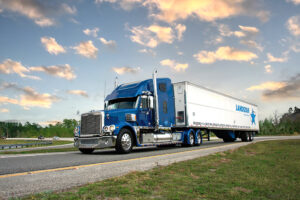For most of the world’s population, 2020 brought never-before-seen challenges, beginning with a global pandemic caused by a new coronavirus first discovered in China in late 2019. As 2020 came to a close, the number of COVID-19 cases — along with deaths related to the disease — continued to climb.
The year also brought the trucking industry into the international spotlight as professional drivers put in countless hours on the road, working to provide hospitals and pharmacies with medical supplies, and grocery stores stocked with essentials (who could ever forget the great toilet-paper shortage?).
For most truck drivers, those hours spent on the road were “all in a day’s work.” Many were surprised when they were greeted with cheers as they made their deliveries. As the year progressed, some of that appreciation faded — but drivers continued to work behind the scenes, making sure vital supplies, as well as little luxuries, reached their destinations in a safe and timely manner.
On Sunday, Dec. 13, truck drivers and other members of the transportation industry once again found themselves in the spotlight as the first shipments of COVID-19 vaccine approved for emergency use in the U.S. by the Food and Drug Administration (FDA) departed Pfizer’s Portage, Michigan, facility. The day was the start of the biggest vaccination effort in U.S. history, an effort that health officials are encouraging the public to embrace, even as many people expressed skepticism or worry about the drug’s safety and effectiveness.
As the first of many freezer-packed COVID-19 vaccine vials made their way to distribution sites that day, the nation’s pandemic deaths approached a new milestone of 300,000 with those numbers expected to skyrocket during the following weeks.
Because Pfizer’s vaccine must be stored at an extremely low temperature — about minus 94 degrees Fahrenheit — quick transport is vital to the success of the immunization effort. On the first day of the rollout, workers at Pfizer — dressed in fluorescent yellow clothing, hard hats and gloves — wasted no time as they packed vials into boxes. They scanned the packages and then placed them into freezer cases with dry ice. The vaccine shipments, tracked with GPS-enabled sensors, were then taken from Pfizer’s Portage, Michigan, facility to Gerald R. Ford International Airport in Grand Rapids, where the first cargo plane took off amid what airport officials called a “jubilant” mood.
“This is a historic day,” said Richard W. Smith, who oversees operations in the Americas for FedEx Express, which delivered more than 630 packages of vaccine to distribution sites across the country the week of Dec. 13. UPS is also transporting a share of the vaccine.
Helping with the transport of the vaccine has special meaning to Bruce Smith, a FedEx package handler at the Grand Rapids airport, whose older sister, Queen, died after she contracted the coronavirus in May. She was hospitalized in Georgia one day after he saw her on a video chat, and they never spoke again.
“I think she would be ecstatic to know that something that has ravaged our family — that a family member is going to be part of such a big project,” said Smith, 58, whose nephew, Queen’s son, also got sick and is still undergoing therapy for stroke-like symptoms. “It is very, very important.”
In addition to FedEx and UPS, Massachusetts-based Boyle Transportation was part of the Dec. 13 vaccine rollout, with two teams of drivers participating in the first convoy to leave Pfizer’s Michigan facility.
“It was an honor for us to play a small role in that historic event,” said Andrew Boyle, co-president of the company, which has been in business for half a century. “There were so many eyes watching, and people crying, seeing your vehicle go by — that’s quite a humbling experience.”
Less than a week later, on Dec. 18, the FDA issued emergency authorization for a second COVID-19 vaccine, this one manufactured by Cambridge, Massachusetts-based Moderna.
FDA Commissioner Dr. Stephen M. Hahn described the approval of the two vaccines as “significant milestones” and “crucial steps” in battling the COVID-19 pandemic, adding that the FDA followed an open, transparent review process for the approval of both drugs.
While much of the transportation of both vaccines will rely on air cargo and last-mile delivery services, Boyle stressed that over-the-road ground freight will continue to play a vital role in transporting both vaccines.
“Up to this point, there have been heroic efforts by the drug developers, the clinical trial participants and the regulators,” Boyle said. “But now, we’re at a point where the execution is going to rely, in large part, on blue-collar transportation and logistics professionals — people on the loading dock, professional truck drivers and mechanics, the air cargo handlers, pilots, and then ultimately the package delivery drivers. Those are our people. We’re not scientists, but we can play our role. We’re not physicians or nurses, but we can play our role.
“Let’s remember, there are millions of people without a job right now. There are millions of people who can’t feed their family members, and there are millions of kids who can’t go to school right now,” he continued. “We have an opportunity to ply our trade and contribute to solving that problem. What greater honor is there?”
The Associated Press contributed to this report.
Linda Garner-Bunch has been with The Trucker since 2020, picking up the reins as managing editor in 2022. Linda has nearly 40 years of experience in the publishing industry, covering topics from the trucking and automotive industry to employment, real estate, home decor, crafts, cooking, weddings, high school sports — you name it, she’s written about it. She is also an experienced photographer, designer and copy editor who has a heartfelt love for the trucking industry, from the driver’s seat to the C-suite.











